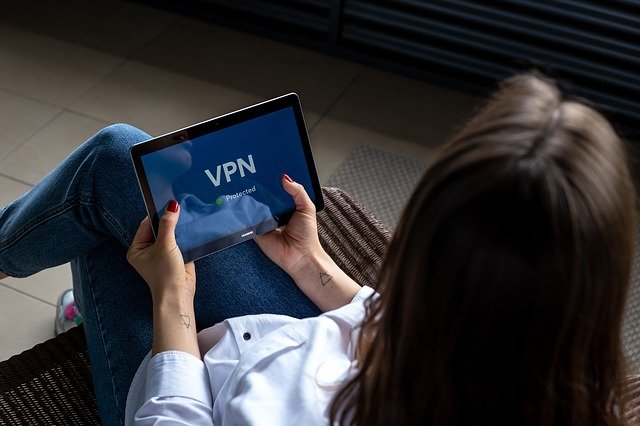Does a VPN Protect You from Hackers?
Michelle Wilson - November 30, 2021

Simply put, yes—a virtual private network (VPN) can protect users from potential hackers. It also improves online privacy and security cost-effectively and securely. The VPN protects a device by maintaining privacy, protecting users from prying eyes (including an internet service provider or anyone trying to spy remotely). While nothing is 100% foolproof, a VPN is a significant improvement in protecting yourself online.
Table of Contents
Could a VPN protect me from hacking attempts on public Wi-Fi?
Essentially, yes. VPNs allow protection through Wi-Fi connections. As there are millions of hot-sports currently accessible worldwide, the use of Wi-Fi is obvious. Unfortunately, the threats that pose potential problems aren’t always easy to spot.
Statistically speaking, Wi-Fi is considerably less secure than cable connections. It works through radio waves, similar to a radio. Anyone can turn on the station and catch the signal. This also means that individuals can capture these signals just as they fly from your device to a router. Malicious players can establish false routers to steal user data. Public Wi-Fi can inject malware onto unsuspecting devices or steal your identity and pretend to be you online.
Do VPNs protect me from hacking attempts at home?

Protecting your home from hacking attempts is essential. With the increasing demand for wireless devices, so too does the risk of attack, especially when it comes to baby monitors, picture frames, and radios. A hacker accesses your personal devices through your IP address, using it to launch attacks and gain access to your data. It can even identify your exact physical location.
A VPN does offer significant protection against hackers or other intrusions to your home network. With a VPN, you won’t transmit your IP address, safeguarding your information from anyone wanting access. The VPN works through two core functions.
Encryption
The virtual private network enables a secure connection between two devices over the internet. All information passed through a VPN server is encrypted, making it unreadable. It then decrypts the content when it arrives at the destination. Most VPNs use AES 256-bit encryption, making data impractical to crack. If a hacker intercepts your data, nothing of use is disclosed.
IP Masking
The IP address is often referred to as your online home address; it can help hackers track for those wanting to locate your real-life address. It ghosts your actual IP address, protecting your identity online, securing your devices, network, and data. Using a VPN helps connect a VPN server before heading online. All activities are marked by the server’s IP address when browsing online.
Other Methods of Protection Online
While a VPN offers a significant layer of defense, there are a few things you can do to protect yourself from hackers. Although these items won’t exclusively protect against hacking, they can help improve your chances of staying safe online. Here are a few tips to increase your level of protection.
- Continue to Keep Your Software Updated: Most software developers keep all security issues patched. Make sure to check the software for any pending updates regularly.
- Enable all Firewalls: While a firewall might not stop every attack, it makes access significantly harder. Always enable the firewall on your system, even if they’re the default option.
- Use Antivirus Software: Whether it’s a private program you’ve purchased or the default setting you’ve got installed, an antivirus program can protect you from injected malware on the device.
- Always Secure Your Router: Change the router’s default password and ensure that the firmware is up to date. Disable features like remote access, WPS, and UPnP to improve security when possible.
- Stay Cautious on Public Wi-Fi: Never access sensitive services on public Wi-Fi. This sensitive information includes banking or government details.
What attacks can a VPN Stop
Several types of attacks are prevented with a VPN. While a VPN doesn’t guarantee protection from an attack, complex and sophisticated attacks are challenging to safeguard. Here are a few cyberattacks that a VPN can prevent.
Man-in-the-Middle (MITM) Attack
A MITM attack intercepts an individual or web server as you’re trying to communicate over the internet. It’s the equivalent of eavesdropping, with the hacker interrupting and stealing data from a current conversation. Once a hacker knows the network you’re on, they exploit its weakness to intercept data transfers. Unfortunately, the user doesn’t even notice the attack until it’s too late.
A VPN encrypts all activity online, making the encryption virtually impossible to crack. The IP gets bounced around to different locations, keeping your actual IP address safe. Attackers have no idea what sites you’re using, preventing interception or redirection.
Remote Hacking
The most effective (and the oldest) method of attack is a hacker gaining access to the system through an IP address. This includes your smart TV, CCTV, smartphone, and anything connected to your Wi-Fi. Virtually every website tracks your IP address, meaning an attack on the site will give your IP to the attacker.
The VPN masks your actual IP address, barring attackers from gaining access through a breach. No website will hold your actual IP address, keeping your Wi-Fi network safe from attack.
DDoS/Dos Attack
DDoS attacks use valuable resources and can prove to be super annoying. The Distributed Denial of Service has a hacker flooding your network with unwanted requests and traffic. The attack can force users offline for some time or crash the service you’re trying to access.
A DDoS attack requires a hacker to know the user’s IP address, making a VPN highly effective against an attack. As such, your network stays safe from attack (although this doesn’t protect against someone who already knows your IP address.
Which Attacks Do VPN Not Protect Against?

A VPN doesn’t protect an individual against attacks requiring your IP address. These unprotected attacks include malware and phishing attacks. Attackers can gain control of the device through malicious software, codes, and files in your system. Visiting unauthorized websites or downloads can expose individuals to malware attacks.
A typical example of a malware attack is when a user downloads an attachment from a fake email. The attachment contains malicious files that can compromise your system once downloaded or opened. In these situations, an antivirus program is the better protection method against attack.
Unfortunately, the VPN won’t protect you against phishing attacks. While most VPNs can protect against shady domains, it doesn’t protect against phishing emails. These emails try to convince readers to submit sensitive information like account numbers or passwords into the fabricated website. These websites are often hard to distinguish from genuine websites, compromising accounts effortlessly. For optimal protection, users can install anti-phishing browser extensions for better security.
Conclusion
While the VPN offers considerable protection against hacking attempts, it’s important to remember it’s not perfect. Any attacks that require the IP address to gain access will be protected, but it continues to safeguard against sophisticated attacks. For optimal protection, always use a VPN when accessing public Wi-Fi networks. The VPN can keep your data and information safe online, particularly if you’re browsing online. It helps ensure an uninterrupted connection, keeping prying eyes away from your data. Although users can still suffer from attacks that don’t require an IP address, the VPN offers considerable protection and is one of many tools to keep users safe online.
Related Posts
Recent Posts
Popular Posts
Sorry. No data so far.








